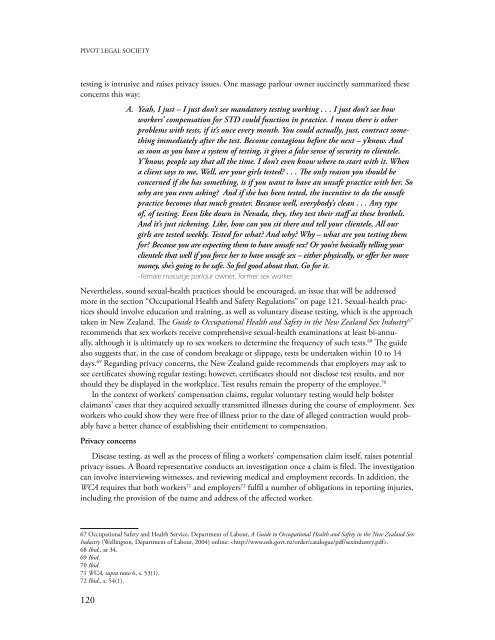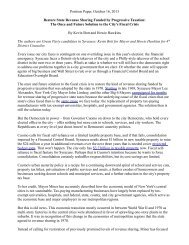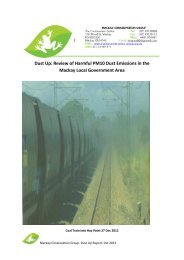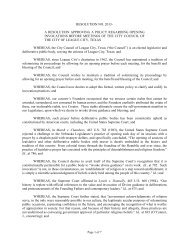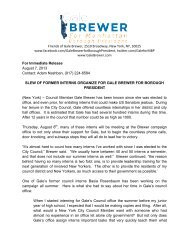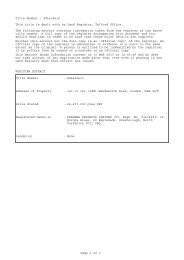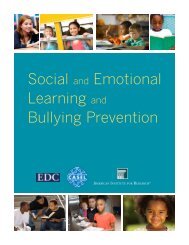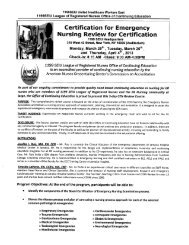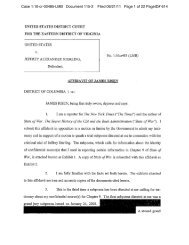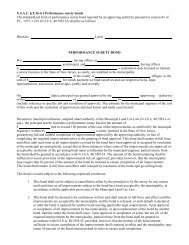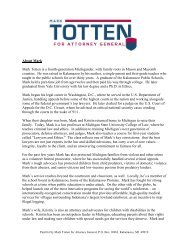PIVOT LEGAL SOCIETYtesting is intrusive <strong>and</strong> raises privacy issues. One massage parlour owner succinctly summarized theseconcerns this way:A. Yeah, I just – I just don’t see m<strong>and</strong>atory testing <strong>work</strong>ing . . . I just don’t see how<strong>work</strong>ers’ compensation for STD could function in practice. I mean there is otherproblems with tests, if it’s once every month. You could actually, just, contract somethingimmediately after the test. Become contagious before the next – y’know. Andas soon as you have a system of testing, it gives a false sense of security to clientele.Y’know, people say that all the time. I don’t even know where to start with it. Whena client says to me, Well, are your girls tested? . . . The only reason you should beconcerned if she has something, is if you want to have an unsafe practice with her. Sowhy are you even asking? And if she has been tested, the incentive to do the unsafepractice becomes that much greater. Because well, everybody’s clean . . . Any typeof, of testing. Even like down in Nevada, they, they test their staff at these brothels.And it’s just sickening. Like, how can you sit there <strong>and</strong> tell your clientele, All ourgirls are tested weekly. Tested for what? And why? Why – what are you testing themfor? Because you are expecting them to have unsafe sex? Or you’re basically telling yourclientele that well if you force her to have unsafe sex – either physically, or offer her moremoney, she’s going to be safe. So feel good about that. Go for it.- female massage parlour owner, former sex <strong>work</strong>erNevertheless, sound sexual-health practices should be encouraged, an issue that will be addressedmore in the section “Occupational Health <strong>and</strong> Safety Regulations” on page 121. <strong>Sex</strong>ual-health practicesshould involve education <strong>and</strong> training, as well as voluntary disease testing, which is the approachtaken in <strong>New</strong> Zeal<strong>and</strong>. The Guide to Occupational Health <strong>and</strong> Safety in the <strong>New</strong> Zeal<strong>and</strong> <strong>Sex</strong> Industry 67recommends that sex <strong>work</strong>ers receive comprehensive sexual-health examinations at least bi-annually,although it is ultimately up to sex <strong>work</strong>ers to determine the frequency of such tests. 68 The guidealso suggests that, in the case of condom breakage or slippage, tests be undertaken within 10 to 14days. 69 Regarding privacy concerns, the <strong>New</strong> Zeal<strong>and</strong> guide recommends that employers may ask tosee certificates showing regular testing; however, certificates should not disclose test results, <strong>and</strong> norshould they be displayed in the <strong>work</strong>place. Test results remain the property of the employee. 70In the context of <strong>work</strong>ers’ compensation claims, regular voluntary testing would help bolsterclaimants’ cases that they acquired sexually transmitted illnesses during the course of employment. <strong>Sex</strong><strong>work</strong>ers who could show they were free of illness prior to the date of alleged contraction would probablyhave a better chance of establishing their entitlement to compensation.Privacy concernsDisease testing, as well as the process of filing a <strong>work</strong>ers’ compensation claim itself, raises potentialprivacy issues. A Board representative conducts an investigation once a claim is filed. The investigationcan involve interviewing witnesses, <strong>and</strong> reviewing medical <strong>and</strong> employment records. In addition, theWCA requires that both <strong>work</strong>ers 71 <strong>and</strong> employers 72 fulfil a number of obligations in reporting injuries,including the provision of the name <strong>and</strong> address of the affected <strong>work</strong>er.67 Occupational Safety <strong>and</strong> Health Service, Department of Labour, A Guide to Occupational Health <strong>and</strong> Safety in the <strong>New</strong> Zeal<strong>and</strong> <strong>Sex</strong>Industry (Wellington, Department of Labour, 2004) online: .68 Ibid., at 34.69 Ibid.70 Ibid.71 WCA, supra note 6, s. 53(1).72 Ibid., s. 54(1).120
BEYOND DECRIMINALIZATION: <strong>Sex</strong> Work, <strong>Human</strong> <strong>Rights</strong> <strong>and</strong> a <strong>New</strong> Frame<strong>work</strong> for Law ReformUnderst<strong>and</strong>ably, many sex <strong>work</strong>ers expressed apprehension about revealing their highly stigmatizedline of <strong>work</strong>:A. See that’s – that’s one of the issues that comes up. Is that in order to access a lot of this,you do have to out yourself. Like, to get <strong>work</strong>er’s compensation, you have to make aclaim, then they investigate the claim, <strong>and</strong> in investigating the claim they go throughyour medical records, they go through everything that happened. They interview allpotential witnesses.- female off-street out-call sex <strong>work</strong>erAnother project participant described her anxiety at the prospect of being labelled a sex <strong>work</strong>er:A. Well just the label. I am just wondering how they will label it once you put it on yourincome tax . . . And that once you have been a sex <strong>work</strong>er, you are a sex <strong>work</strong>er forthe rest of your life. You just carry it around like an anchor – I was 20 years old <strong>and</strong>I <strong>work</strong>ed as a sex <strong>work</strong>er – woahhhhhhhhhh, it said it on your income tax, little girl.Meanwhile you are 60. So that’s just my issue.- female off-street out-call sex <strong>work</strong>erHowever, provisions within the WCA make it clear that the Board should treat claim files as confidential,<strong>and</strong> not accessible to third parties upon their request. 73 Similarly, medical reports should not bedisclosed, except for the purposes of administering the WCA <strong>and</strong> regulations. 74Occupational Health <strong>and</strong> Safety RegulationsThe WCA has an associated set of regulations, the Occupational Health <strong>and</strong> Safety Regulations 75 (the“OHSR”), which sets out the minimum requirements for health <strong>and</strong> safety st<strong>and</strong>ards in industriescovered by the WCA. 76Under the <strong>New</strong> Zeal<strong>and</strong> PRA all sex <strong>work</strong>ers, regardless of their employment or contractual status,are under a duty to follow health <strong>and</strong> safety st<strong>and</strong>ards.The WCA 77 <strong>and</strong> the OHSR sets out general duties for employers to ensure the health <strong>and</strong> safety ofall <strong>work</strong>ers <strong>and</strong> others in the <strong>work</strong>place by remedying unsafe conditions, informing <strong>work</strong>ers of theirrights, <strong>and</strong> ensuring that employers provide <strong>and</strong> maintain proper protective equipment. Also, theWCA requires employers to establish an occupational health <strong>and</strong> safety program. Generally, such aprogram would place responsibilities on employers <strong>and</strong> <strong>work</strong>ers to ensure that all <strong>work</strong> is carried outwithout undue risk of occupational disease or injury to any person. 78 Duties include regular inspectionsof the <strong>work</strong>place <strong>and</strong> <strong>work</strong> practices, instruction <strong>and</strong> supervisions of <strong>work</strong>ers, investigations intoany unsafe occurrences, <strong>and</strong> the maintenance of records, all with an eye to preventing the developmentof unsafe <strong>work</strong>ing conditions. 79 Under the OHSR, employers are accountable to the Board, <strong>and</strong>the Board maintains the authority to enact health <strong>and</strong> safety regulations as it sees fit. 80The majority of sex <strong>work</strong>ers stated that they would support the application of the OHSR to sex<strong>work</strong>, <strong>and</strong> the resulting increased obligations for employers to ensure <strong>work</strong>place health <strong>and</strong> safety.One massage parlour owner explained that the onus should fall on the employer because sex <strong>work</strong>ersare often not in a position where they are able to protect their health <strong>and</strong> safety:73 Ibid., s. 95.74 Ibid., s. 156(1)(a).75 OHSR, supra note 7.76 Ibid., s. 2.1.77 WCA, supra note 6, s. 115.78 OHSR, supra note 7, s. 2.2.79 Ibid., s. 3.3.80 WCA, supra note 6, s. 225.121
- Page 4:
PIVOT LEGAL SOCIETYPart 2: Municipa
- Page 21 and 22:
BEYOND DECRIMINALIZATION: Sex Work,
- Page 23 and 24:
BEYOND DECRIMINALIZATION: Sex Work,
- Page 25 and 26:
BEYOND DECRIMINALIZATION: Sex Work,
- Page 27 and 28:
BEYOND DECRIMINALIZATION: Sex Work,
- Page 29 and 30:
BEYOND DECRIMINALIZATION: Sex Work,
- Page 31 and 32:
BEYOND DECRIMINALIZATION: Sex Work,
- Page 33 and 34:
BEYOND DECRIMINALIZATION: Sex Work,
- Page 35 and 36:
BEYOND DECRIMINALIZATION: Sex Work,
- Page 37 and 38:
BEYOND DECRIMINALIZATION: Sex Work,
- Page 39 and 40:
BEYOND DECRIMINALIZATION: Sex Work,
- Page 41 and 42:
BEYOND DECRIMINALIZATION: Sex Work,
- Page 43 and 44:
BEYOND DECRIMINALIZATION: Sex Work,
- Page 45 and 46:
BEYOND DECRIMINALIZATION: Sex Work,
- Page 47 and 48:
BEYOND DECRIMINALIZATION: Sex Work,
- Page 49 and 50:
BEYOND DECRIMINALIZATION: Sex Work,
- Page 51 and 52:
BEYOND DECRIMINALIZATION: Sex Work,
- Page 53 and 54:
BEYOND DECRIMINALIZATION: Sex Work,
- Page 55 and 56:
BEYOND DECRIMINALIZATION: Sex Work,
- Page 57 and 58:
BEYOND DECRIMINALIZATION: Sex Work,
- Page 59 and 60:
BEYOND DECRIMINALIZATION: Sex Work,
- Page 61 and 62:
BEYOND DECRIMINALIZATION: Sex Work,
- Page 63 and 64:
BEYOND DECRIMINALIZATION: Sex Work,
- Page 65 and 66:
BEYOND DECRIMINALIZATION: Sex Work,
- Page 67 and 68:
BEYOND DECRIMINALIZATION: Sex Work,
- Page 69 and 70: BEYOND DECRIMINALIZATION: Sex Work,
- Page 71 and 72: BEYOND DECRIMINALIZATION: Sex Work,
- Page 73 and 74: BEYOND DECRIMINALIZATION: Sex Work,
- Page 75 and 76: BEYOND DECRIMINALIZATION: Sex Work,
- Page 77 and 78: BEYOND DECRIMINALIZATION: Sex Work,
- Page 79 and 80: BEYOND DECRIMINALIZATION: Sex Work,
- Page 81 and 82: BEYOND DECRIMINALIZATION: Sex Work,
- Page 83 and 84: BEYOND DECRIMINALIZATION: Sex Work,
- Page 85 and 86: BEYOND DECRIMINALIZATION: Sex Work,
- Page 87 and 88: BEYOND DECRIMINALIZATION: Sex Work,
- Page 89 and 90: BEYOND DECRIMINALIZATION: Sex Work,
- Page 91 and 92: BEYOND DECRIMINALIZATION: Sex Work,
- Page 93 and 94: BEYOND DECRIMINALIZATION: Sex Work,
- Page 95 and 96: BEYOND DECRIMINALIZATION: Sex Work,
- Page 97 and 98: BEYOND DECRIMINALIZATION: Sex Work,
- Page 99 and 100: BEYOND DECRIMINALIZATION: Sex Work,
- Page 101 and 102: BEYOND DECRIMINALIZATION: Sex Work,
- Page 103 and 104: BEYOND DECRIMINALIZATION: Sex Work,
- Page 105 and 106: BEYOND DECRIMINALIZATION: Sex Work,
- Page 107 and 108: BEYOND DECRIMINALIZATION: Sex Work,
- Page 109 and 110: BEYOND DECRIMINALIZATION: Sex Work,
- Page 111 and 112: BEYOND DECRIMINALIZATION: Sex Work,
- Page 113 and 114: BEYOND DECRIMINALIZATION: Sex Work,
- Page 115 and 116: BEYOND DECRIMINALIZATION: Sex Work,
- Page 117 and 118: BEYOND DECRIMINALIZATION: Sex Work,
- Page 119: BEYOND DECRIMINALIZATION: Sex Work,
- Page 123 and 124: BEYOND DECRIMINALIZATION: Sex Work,
- Page 125 and 126: BEYOND DECRIMINALIZATION: Sex Work,
- Page 127 and 128: BEYOND DECRIMINALIZATION: Sex Work,
- Page 129 and 130: BEYOND DECRIMINALIZATION: Sex Work,
- Page 131 and 132: BEYOND DECRIMINALIZATION: Sex Work,
- Page 133 and 134: BEYOND DECRIMINALIZATION: Sex Work,
- Page 135 and 136: BEYOND DECRIMINALIZATION: Sex Work,
- Page 137 and 138: BEYOND DECRIMINALIZATION: Sex Work,
- Page 139 and 140: BEYOND DECRIMINALIZATION: Sex Work,
- Page 141 and 142: BEYOND DECRIMINALIZATION: Sex Work,
- Page 143 and 144: BEYOND DECRIMINALIZATION: Sex Work,
- Page 145 and 146: BEYOND DECRIMINALIZATION: Sex Work,
- Page 147 and 148: BEYOND DECRIMINALIZATION: Sex Work,
- Page 149 and 150: BEYOND DECRIMINALIZATION: Sex Work,
- Page 151 and 152: BEYOND DECRIMINALIZATION: Sex Work,
- Page 153 and 154: BEYOND DECRIMINALIZATION: Sex Work,
- Page 155 and 156: BEYOND DECRIMINALIZATION: Sex Work,
- Page 157 and 158: BEYOND DECRIMINALIZATION: Sex Work,
- Page 159 and 160: BEYOND DECRIMINALIZATION: Sex Work,
- Page 161 and 162: BEYOND DECRIMINALIZATION: Sex Work,
- Page 163 and 164: BEYOND DECRIMINALIZATION: Sex Work,
- Page 165 and 166: BEYOND DECRIMINALIZATION: Sex Work,
- Page 167 and 168: BEYOND DECRIMINALIZATION: Sex Work,
- Page 169 and 170: BEYOND DECRIMINALIZATION: Sex Work,
- Page 171 and 172:
BEYOND DECRIMINALIZATION: Sex Work,
- Page 173 and 174:
BEYOND DECRIMINALIZATION: Sex Work,
- Page 175 and 176:
BEYOND DECRIMINALIZATION: Sex Work,
- Page 177 and 178:
BEYOND DECRIMINALIZATION: Sex Work,
- Page 179 and 180:
BEYOND DECRIMINALIZATION: Sex Work,
- Page 181 and 182:
BEYOND DECRIMINALIZATION: Sex Work,
- Page 183 and 184:
BEYOND DECRIMINALIZATION: Sex Work,
- Page 185 and 186:
BEYOND DECRIMINALIZATION: Sex Work,
- Page 187 and 188:
BEYOND DECRIMINALIZATION: Sex Work,
- Page 189 and 190:
BEYOND DECRIMINALIZATION: Sex Work,
- Page 191 and 192:
BEYOND DECRIMINALIZATION: Sex Work,
- Page 193 and 194:
BEYOND DECRIMINALIZATION: Sex Work,
- Page 195 and 196:
BEYOND DECRIMINALIZATION: Sex Work,
- Page 197 and 198:
BEYOND DECRIMINALIZATION: Sex Work,
- Page 199 and 200:
BEYOND DECRIMINALIZATION: Sex Work,
- Page 201 and 202:
BEYOND DECRIMINALIZATION: Sex Work,
- Page 203 and 204:
BEYOND DECRIMINALIZATION: Sex Work,
- Page 205 and 206:
BEYOND DECRIMINALIZATION: Sex Work,
- Page 207 and 208:
BEYOND DECRIMINALIZATION: Sex Work,
- Page 209 and 210:
BEYOND DECRIMINALIZATION: Sex Work,
- Page 211 and 212:
BEYOND DECRIMINALIZATION: Sex Work,
- Page 213 and 214:
BEYOND DECRIMINALIZATION: Sex Work,
- Page 215 and 216:
BEYOND DECRIMINALIZATION: Sex Work,
- Page 217 and 218:
BEYOND DECRIMINALIZATION: Sex Work,
- Page 219 and 220:
BEYOND DECRIMINALIZATION: Sex Work,
- Page 221 and 222:
BEYOND DECRIMINALIZATION: Sex Work,
- Page 223 and 224:
BEYOND DECRIMINALIZATION: Sex Work,
- Page 225 and 226:
BEYOND DECRIMINALIZATION: Sex Work,
- Page 227 and 228:
BEYOND DECRIMINALIZATION: Sex Work,
- Page 229:
BEYOND DECRIMINALIZATION: Sex Work,


